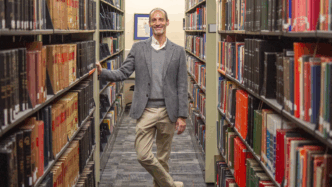‘Nurturing Democratic Responsibility in the Age of Artificial Intelligence’ is the theme of the 25th Annual Conference on Ethics Across the Curriculum
The Society for Ethics Across the Curriculum (SEAC) will hold its 25th annual conference at Clemson University on October 3-5, 2024 with the theme of ‘Nurturing Democratic Responsibility in the Age of Artificial Intelligence.’
The conference is organized by two faculty members in Clemson’s Department of Philosophy and Religion: Kathryn and Calhoun Lemon Professor of Philosophy Daniel Wueste and Senior Lecturer Edyta Kuzian.
“AI is already a significant force in our lives. It has been especially impactful in healthcare, and it has transformed insurance and finance. Its integration into democratic systems and processes presents many challenges, more than a few of which are ethical,” Wueste explained. “Indeed, government of the people, by the people, and for the people may be on the line. Challenges to democracy need to be approached and managed responsibly. That burden will be borne by our students, and we need to do what we can to prepare them for that.”
The conference will feature two keynote addresses, the second of which is free and open to the public.
It is essential that the Humanities be fully engaged with thinking through the implications of the new technology’s unimaginably advanced capabilities.
Nicholas Vazsonyi, Founding Dean, College of Arts and Humanities
Free for Clemson students
Clemson students will be admitted to all conference sessions for free with their student IDs, and Clemson employees will receive a discount on registration to attend. A full list of sessions and speakers can be seen here.
Kuzian proposed Clemson as the site of the conference due to its outstanding academic standing and inclusive community, she said.
“Clemson University has a history of rigorous commitment to ethical research and interdisciplinary engagement, making it an ideal location for insightful discussions on ethics,” Kuzian noted. “Additionally, we wanted to showcase the City of Clemson, which offers a charming, yet vibrant setting that fosters learning and networking opportunities. The university’s cutting-edge facilities and the enthusiastic participation of its diverse faculty and student body further ensure the conference’s success. Together, the institution and the city promise an enriching and memorable experience for all attendees.”
Keynote speakers
The first keynote, by Damien Patrick Williams, (title), is titled “On Truth, Values, Knowledge, and Democracy in the Age of Generative ‘AI.’” Williams is an assistant professor in Philosophy and Data Science at the University of North Carolina at Charlotte, whose research focuses on “how technologies such as algorithms, machine intelligence, and biotechnologies are impacted by the values, knowledge systems, philosophical explorations, social structures, and even religious beliefs of human beings.”
The second keynote, presented by Eric Mlyn is “Higher Education in the Crosshairs: The Politics of American Higher Education.” Mlyn’s keynote will be free and open to the public at 6 p.m. on October 5 in the Madren Conference Center Auditorium.

Mlyn is a Distinguished Faculty Fellow at the Kenan Institute for Ethics and Lecturer at Duke University’s Sanford School for Public Policy. He leads a research project on Democracy and Higher Education, examining threats to academic freedom, university governance and related topics. His research focuses on the role of higher education in the promotion of democracy.
“I am extremely proud that Clemson will be hosting this important international conference that focuses on perhaps the most pressing issue of our time,” said Nicholas Vazsonyi, founding dean of Clemson’s College of Arts and Humanities. “The sudden arrival of social media caught us unprepared, and we are still trying to figure out how best to deal with the consequences for us and our children. If we are to avoid a similar problem with AI, it is essential that the Humanities be fully engaged with thinking through the implications of the new technology’s unimaginably advanced capabilities.”
Where to register
More information about conference registration may be found on the conference website. The discounted registration rate for Clemson employees is $100.







